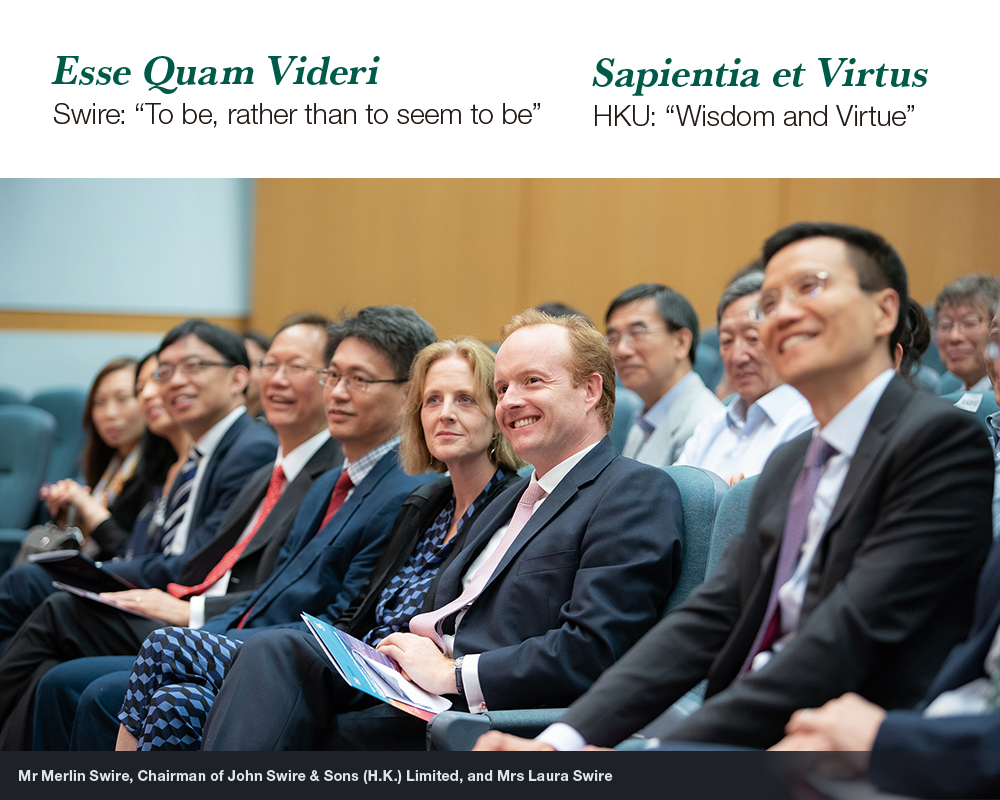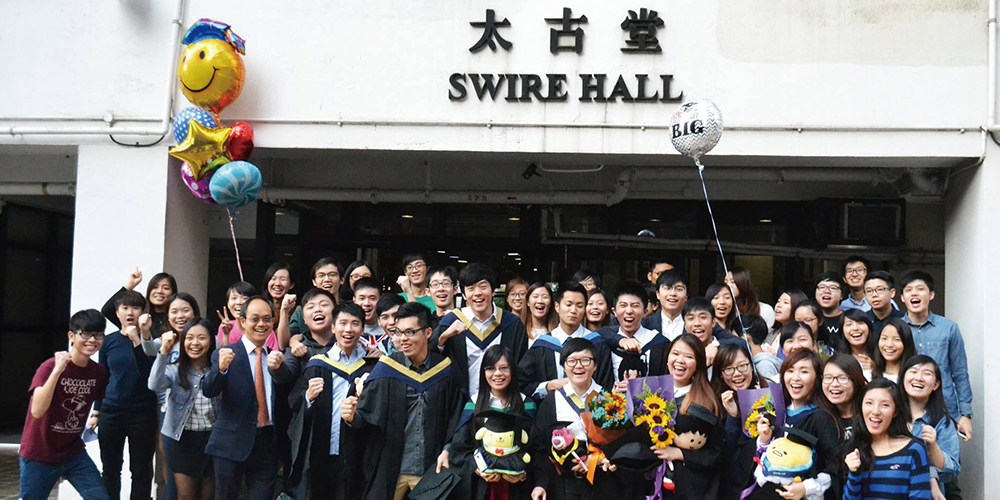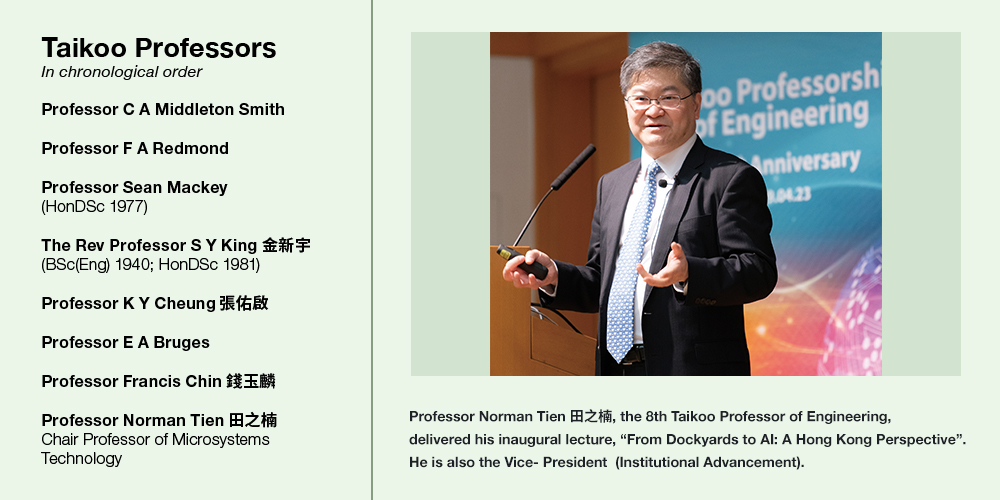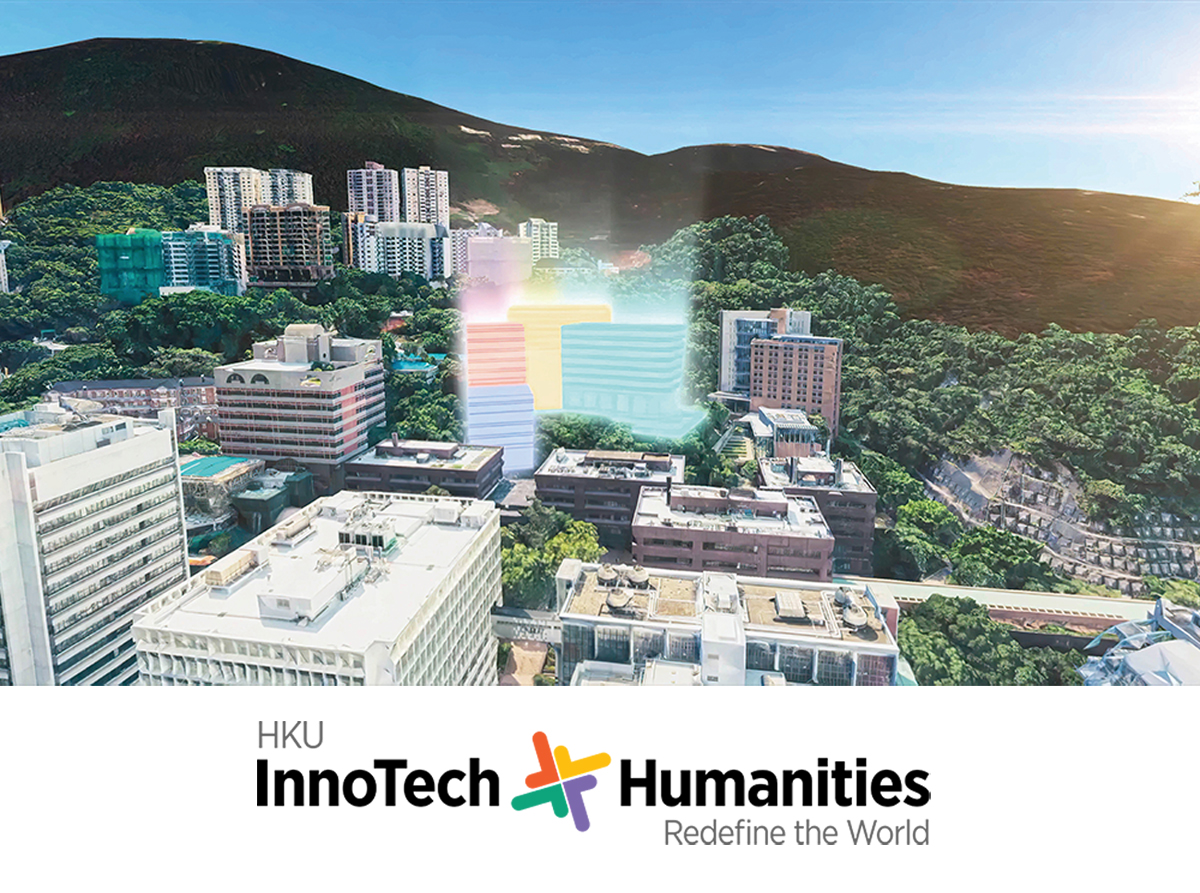
HKU will launch a groundbreaking initiative to advance our resources for cutting-edge research and entrepreneurship. Our vision is to use the power of world-class innovation and technology to improve humanity.
TECH LANDMARK
HEADQUATERS OF INNOTECH
The Tech Landmark, a complex of four towers, will be the next major development at the University.
After its establishment in 1911 on the historic Main Campus with the iconic Main Building, the University grew vastly to include all 10 faculties: Architecture, Arts, Business & Economics, Dentistry, Education, Engineering, Law, Medicine, Science, and Social Sciences.
In 2011, the Centennial Campus was completed to serve as the homes of the Faculties of Arts, Law, and Social Sciences. It also houses the Lee Shau Kee Lecture Centre, which includes the 1,000-seat Grand Hall, and the Chi Wah Learning Commons, a state-of-the-art collaborative student learning space.
Now the Tech Landmark, planned for 2024, will mark HKU’s new horizons as it enters its second century.
The Tech Landmark will house 10 institutes serving as national platforms with global impact. The Lee Shau Kee Institute of the Mind was the first to be announced.
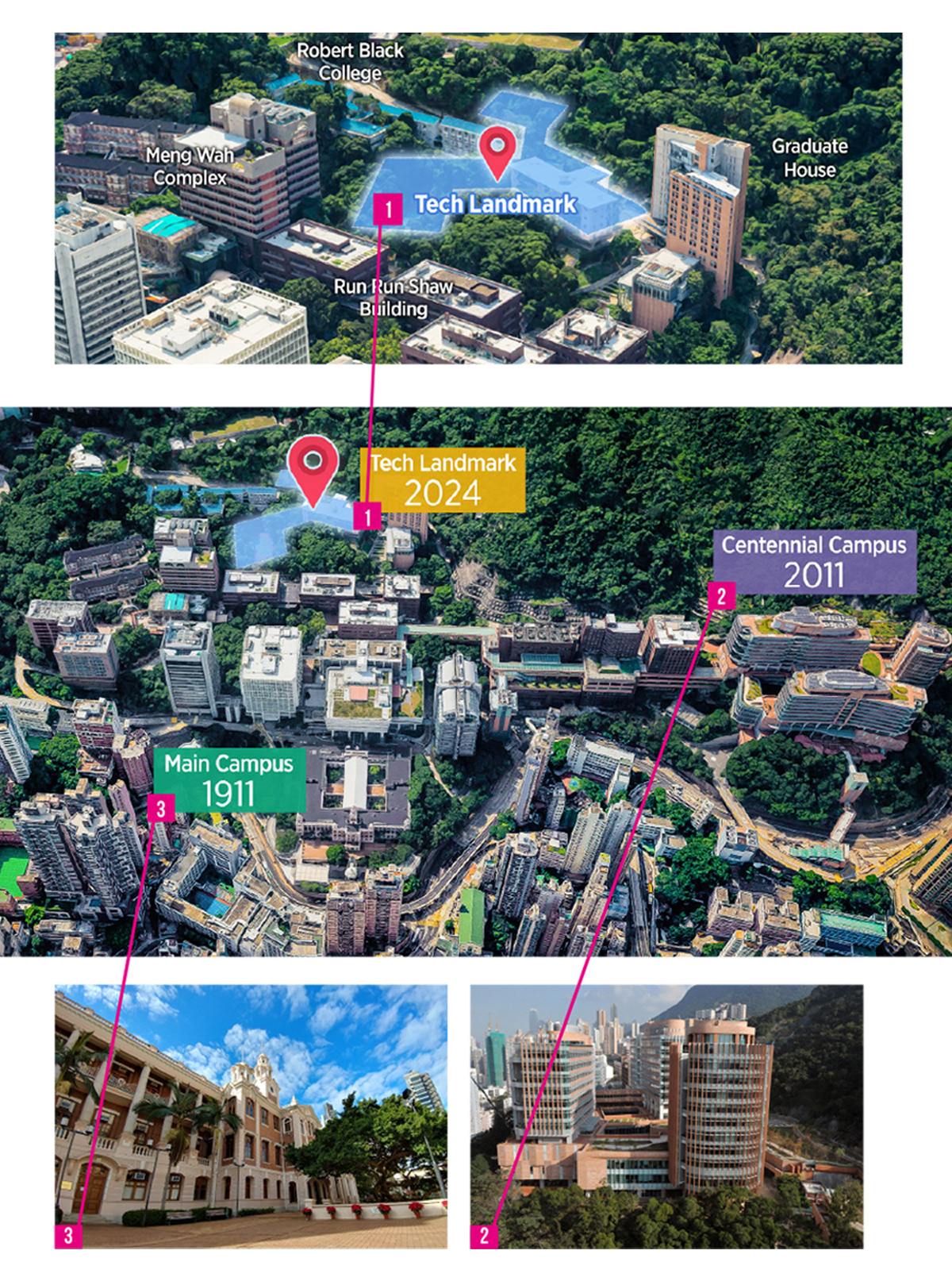
GROWING THE TALENT HUB
HKU is proud to build on a foundation of academic excellence. According to Clarivate Analytics, 114 of our professors were ranked among the world’s top 1% of scientists, and 15 are among the world’s most highly cited researchers in 2018.
Going forward, we shall work to nurture our talents and recruit top researchers from all over the world.
Our goal is to add 50 new Endowed Professorships, and enhance a scheme that honours and supports eminent academics. A total of 116 Endowed Professorships have been established since 2005.
Three new schemes have been created, with plans for 100 recipients each.
· Outstanding Young Professorships (OYP) will be for rising talents at the Associate Professor and Assistant Professor
levels.
· Presidential Postdoctoral Fellowships will host the world’s finest post-doctoral talents to undertake frontier research.
· The Presidential PhD Scholars scheme will support students with great potential to excel in their research fields.
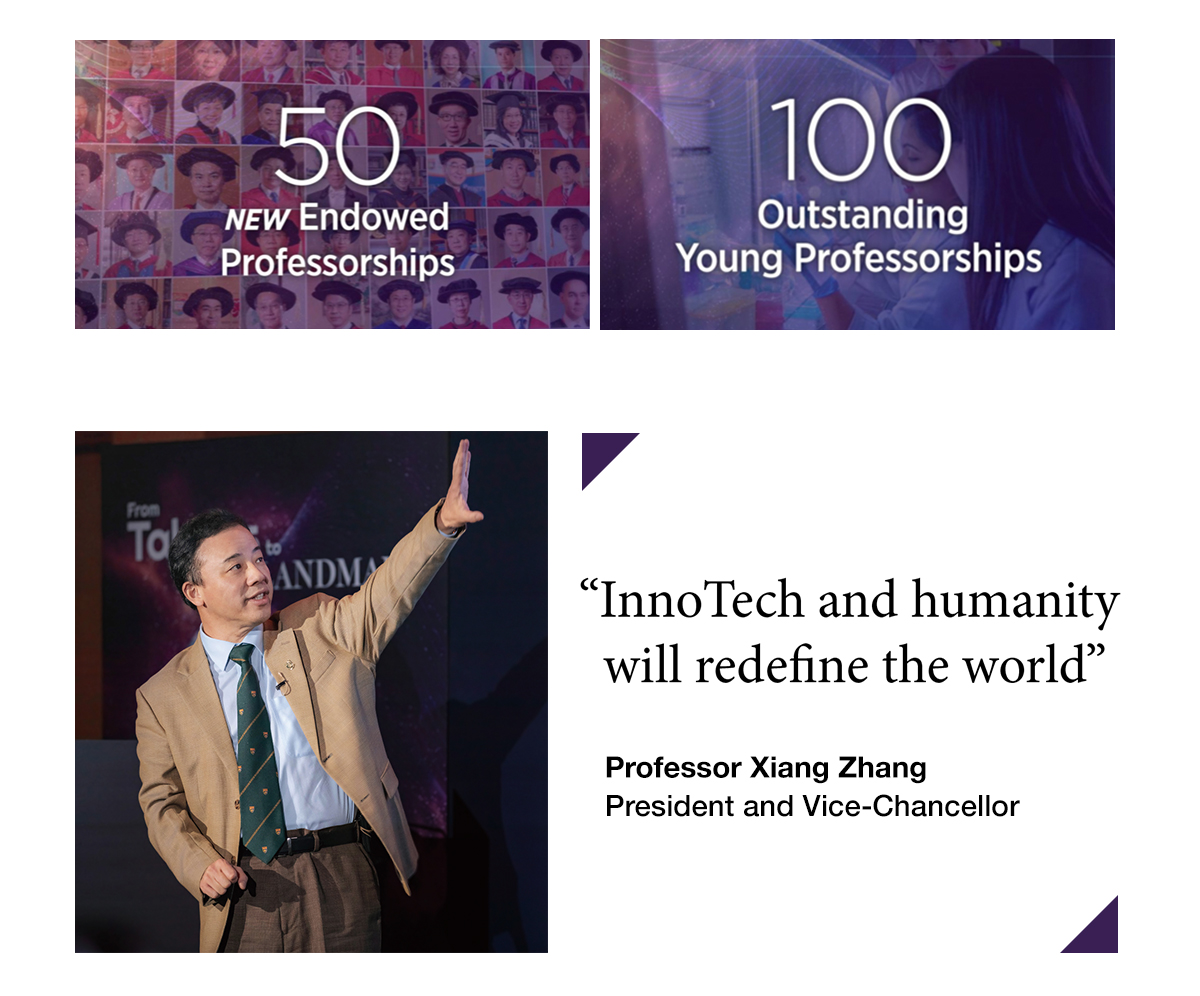
FROM THE PRESIDENT
At The University of Hong Kong, we believe that InnoTech will be the driving force in advancing humanity and redefining the world. In the next five years, we will enhance both the physical space and human resources for InnoTech.
The Tech Landmark, a complex of four towers, will be built to house new institutes dedicated to interdisciplinary studies and emerging fields such as artificial intelligence (AI), big data, smart materials, quantum science, and biomedical engineering. The complex will serve as a hub for innovative thinking, learning, teaching, research, and entrepreneurship.
We will enhance support for current talents at the University, while recruiting top academics from around the world.
These efforts will help position HKU as a world leader seeking solutions to world problems. Together, we will take HKU to new heights.
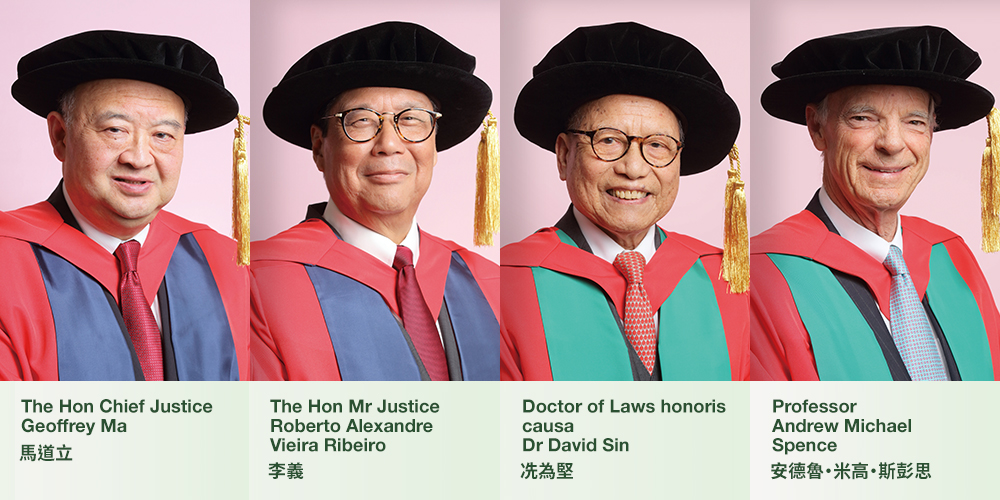
Doctor of Laws honoris causa
The Hon Chief Justice Geoffrey Ma 馬道立
Chief Justice Ma has presided over the Court of Final Appeal, Hong Kong’s highest court, since 2010. As a determined champion for the rule of law, a judge and leader of the Judiciary, he is, in the Platonic sense, one of our most accomplished public figures.
The Hon Mr Justice Roberto Alexandre Vieira Ribeiro 李義
Mr Justice Ribeiro has a formidable reputation both in Hong Kong and elsewhere in the common law world. He has made profoundly significant contributions to the jurisprudence of Hong Kong and common law in general.
Doctor of Social Sciences honoris causa
Dr David Sin 冼為堅
The Chairman of Myer Jewelry Manufacturer Limited is a business leader and advocate of higher education. The Sin Wai Kin Fund and Sin Wai Kin Distinguished Visiting Professorship in the Humanities were established to support the Hong Kong Institute for the Humanities and Social Sciences at HKU.
Professor Andrew Michael Spence 安德魯・米高・斯彭思
The Nobel Laureate in Economic Sciences is a world authority on growth in developing countries and on the convergence between advanced and developing economies. He is the Co-Chair of the Advisory Council of the Asia Global Institute, HKU.
The Hon Chief Justice Geoffrey Ma’s speech on behalf of the Honorary Graduates at the 201st Congregation on April 2, 2019
An Edited Extract: There should be not only a respect for one’s own rights and freedoms but also the rights and freedoms of others.
After all, the guarantee of equality emphasised and repeated in the Basic Law and in the Bill of Rights reflects the basic assumptions of tolerance, respect and compromise. These are the assumptions behind a sense of community.
For me, I regard the award of this degree as very much one which belongs to the Hong Kong Judiciary, which I represent. The importance of an independent judiciary to Hong Kong cannot be overstated. To start with, the Basic Law, the constitutional document that governs the Hong Kong Special Administrative Region (which, as its Preamble provides, was enacted by the National People’s Congress to ensure the implementation of the basic policies of the PRC regarding Hong Kong) states in three different articles that Hong Kong shall have independent judicial power. The Judicial Oath required to be taken by all judges provides that judges must “administer justice without fear or favour, self-interest or deceit”.
Independence of the Judiciary is essential when dealing with the many complex legal issues before the courts. In the area of public law, where the public interest is engaged, cases often involve the Government and public authorities. There is little doubt that, like society in general, the law and the cases handled by the courts have become much more complex than before. This is inevitable when we see the growth of the community through the years: in 1841, the population of Hong Kong was 7,450; at the turn of the 20th century, in 1901, it had risen to 283,978; after the 2nd World War, in 1950, it was 2.2 million; in 2001, the population had become 6.7 million; and it is now about 7.5 million. When one adds to this the greater awareness, particularly after July 1, 1997, of political, economic and social dimensions, it is easy to infer that life in general has become more complex.
I have earlier mentioned public law cases. These are cases which sometimes originate from political, economic or social controversies, on which members of the public may have strong views. These views are often diverse and at odds with one another, and at times seemingly impossible to reconcile. The various freedoms and rights that are enumerated in the Basic Law are not always easy to apply and, as a matter of law, their enforcement by the courts often involve having to adjudicate between perfectly legitimate interests which pull in different directions.
The difficulty for the courts can sometimes lie in how to resolve legitimate, but conflicting, considerations.
Depending on the facts of any given case, some considerations will prevail over others and, sometimes, a balancing exercise is required to be undertaken. It is, however, important at all times for judges to be even-handed and, just as important, seen to be so. This is why the independence of the Judiciary is important in order to ensure that all cases that come before the courts, be they controversial or not, are decided strictly according to the law and legal principle, and nothing else.
I mentioned just now that a balancing exercise may sometimes have to be performed. This approach is to recognise the validity and legitimacy of all reasonable points of view which a judge may have to take into account in the determination of a legal dispute. Broadly speaking, it is a recognition that not only individual rights have to be considered, but also the rights and interests of other members of the community and the community as a whole.
And this, surely, must be how a community should be expected to function: as I have often said in the past,

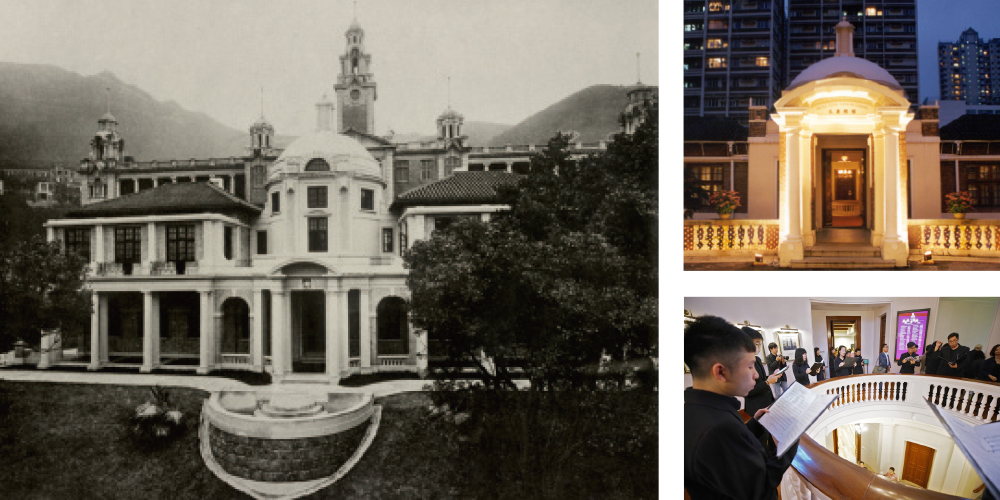
During the chamber recital, singers took advantage of the excellent acoustics under the building’s signature dome, and gave a vocal performance while standing on the upper rotunda. Student musicians also performed in the Foundation Chamber on a mix of instruments – the traditional Chinese dizi and guzheng, as well as the flute, harmonica, marimba, and piano.
The performance was curated by Professor Daniel Chua蔡寬量, who holds the Mr and Mrs Hung Hing-Ying Professorship in the Arts; Professor Chan Hing-yan 陳慶恩, who holds the James Chen and Yuen-Han Chan Professorship in Music; and Professor Giorgio Biancorosso.
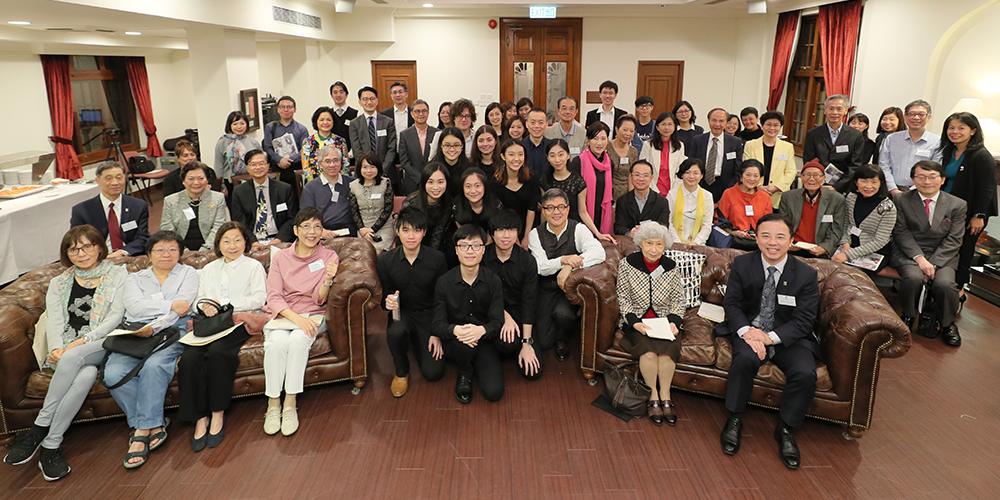
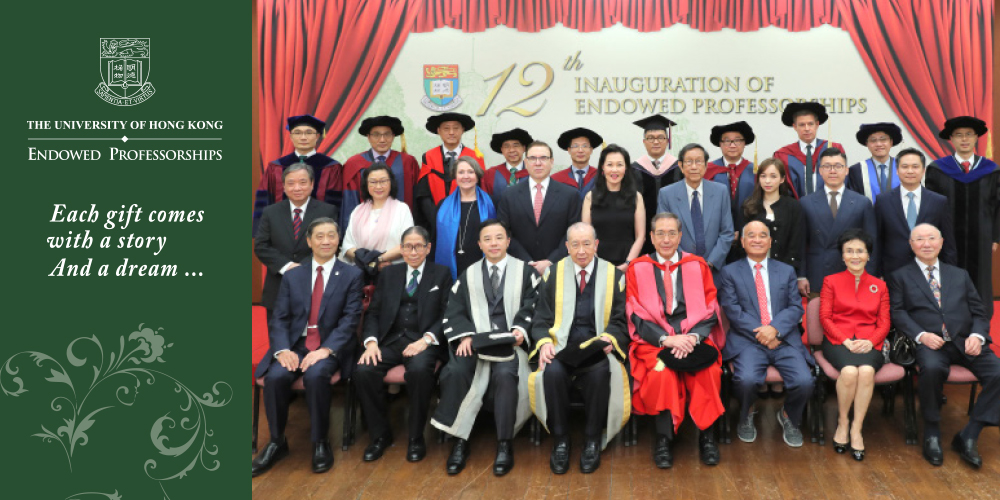
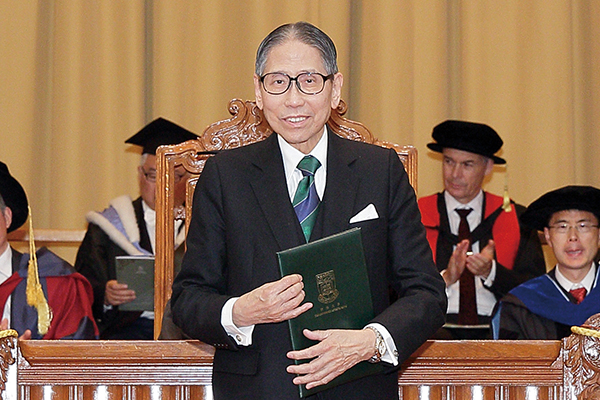
Leong Che-Hung Distinguished Visiting Professorship in Leadership
梁智鴻傑出訪問教授席 (領航)
Appointment to be announced 待聘
“University education is more than adding knowledge or engaging in vocational training. It encompasses the preparation of young people to meet the myriad of challenges in society and to take up leadership roles. This Distinguished Visiting Professorship will inspire students to excel in both.”
Dr Leong Che-Hung
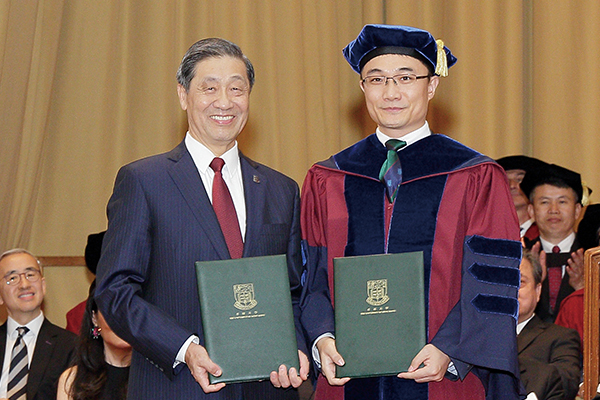
Patrick S C Poon Professorship in Analytics and Innovation
潘燊昌基金教授席 (數據科學與創新)
Incumbent: Shen Haipeng 沈海鵬
“Analytics and Innovation are the basic drivers for the continuous and sustainable progress of the society of human beings. May HKU continue to lead in the research and teaching of these important factors for a better world.”
Dr Patrick Poon
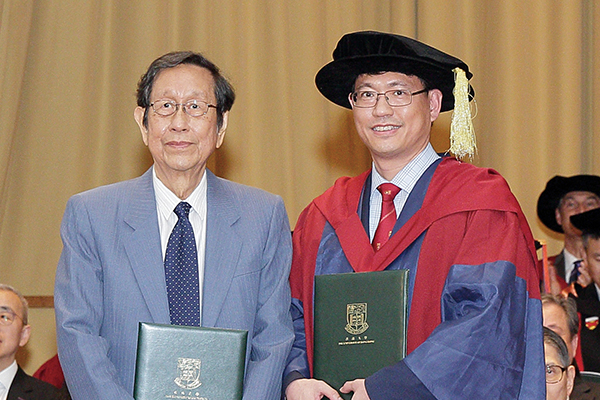
Ko Wong Wai Ching Wendy Professorship in Fluid Dynamics
高黃慧貞基金教授席 (流體動力學)
Appointment to be announced 待聘
WENDY
MY CLASSMATE MY LOVER MY WIFE
MY ADVISER MY FINANCIER
MY LIFELONG COMPANION
FULLY UNDERSTOOD
THE IMPORTANCE OF
FLUID DYNAMICS
TO THE WORLD
EVEN
TO THE UNIVERSE
NORMAN
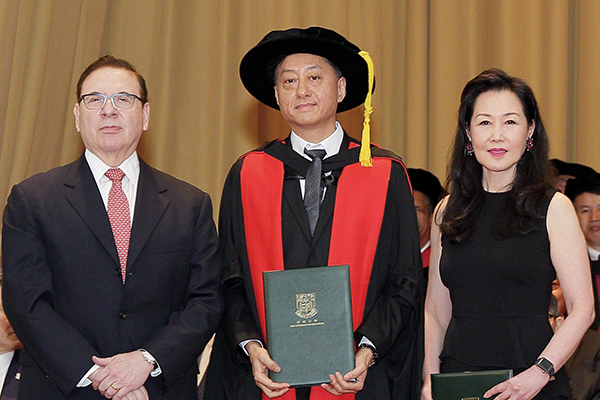
Sein and Isaac Souede Professorship in Economic History
蘇威趙善敏基金教授席 (經濟史)
Incumbent: James K S Kung 龔啟聖
“We hope this Endowed Professorship will bring the power of fact-based thought leadership to bear. Sharing new knowledge freely will inspire discussions and give fresh insights into our understanding of society.”
Sein and Isaac Souede

Norman and Cecilia Yip Professorship in Bioinorganic Chemistry
葉志成范港喜基金教授席 (生物無機化學)
Incumbent: Sun Hongzhe 孫紅哲
“We established this Endowed Professorship in celebration of the Faculty of Science’s 80th anniversary. Chemistry changed our lives and studying it, in particular, taught me the keys to thinking and action.We hope this Professorship will be the catalyst for even greater outcomes in the study of bioinorganic chemistry.”
Norman and Cecilia Yip
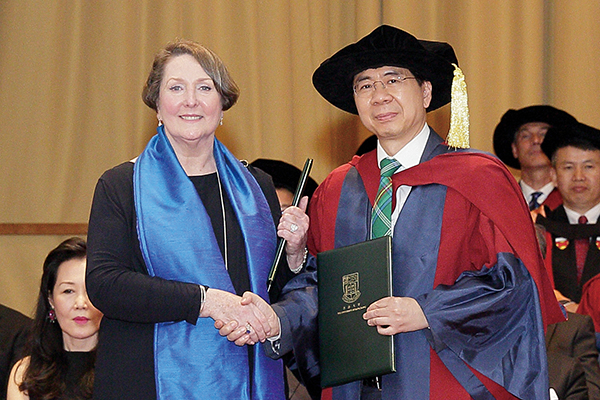
Ian Davies Professorship in Ethics
戴義安基金教授席 (倫理)
Incumbent: Simon S K Lam 林誠光
“This Professorship will expound all the qualities that our former Vice-Chancellor Professor Ian Davies epitomised: integrity, the spirit and principles of ethics, and the sharing of knowledge gained for the betterment of society. A man of great honour, his legacy will rightfully be perpetuated through this Professorship.”
Executors of the Estate of Professor Ian Davies
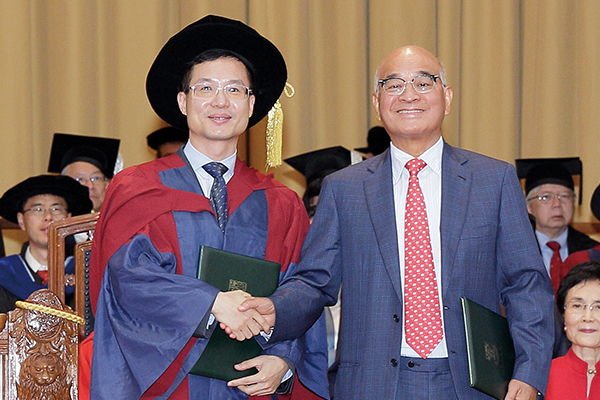
Henry Cheng Professorship in International Law
鄭家純基金教授席 (國際法)
Incumbent: Zhao Yun 趙雲
“Giving back to society has always been at the heart of my family. Hong Kong is an international city and international law is in action affecting every aspect of our life. With its unique position in China and Asia, Hong Kong is best placed to be Asia-Pacific’s international legal and dispute resolution centre. It is now for Hong Kong to forge itself as one of the leading international law hubs in the world. I hope this Professorship will contribute to the maintenance of the rule of law and to Hong Kong’s place in the global legal environment.”
Dr Henry Cheng Kar-Shun
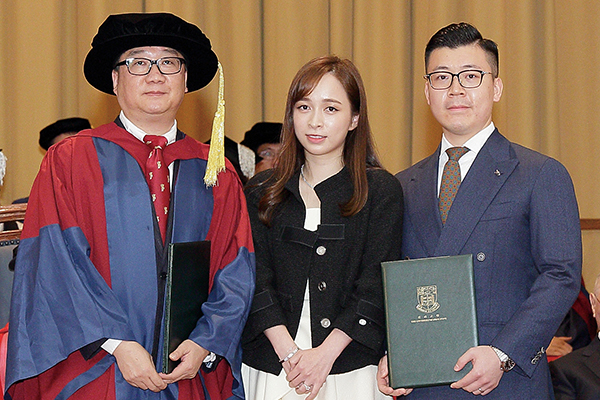
Antony and Nina Chan Professorship in Paediatric Immunology
陳仲舒陳寧基金教授席 (兒童免疫)
Incumbent: Tu Wenwei 涂文偉
“As the parents of two young children, we clearly understand the importance of health and medical advancement for the next generation. We hope this Professorship can contribute to delivering effective immunological solutions for human diseases.”
Antony and Nina Chan
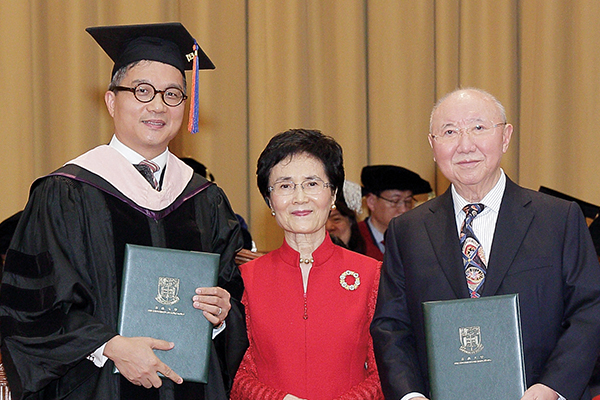
James Chen and Yuen-Han Chan Professorship in Music
陳健華陳遠嫻基金教授席 (音樂)
Incumbent: Chan Hing-Yan 陳慶恩
“We hope that through exceptional music education, the younger generations will grow to become sincere, kind and treasured talents. The establishment of this Professorship is only a prelude, and we hope that it can play a harmonious part in the development of music education in Hong Kong.”
Mr James Chen and Ms Yuen-Han Chan


UK Friends of HKU was unveiled on June 18, 2019 at a cocktail reception co-hosted by the Hong Kong Economic and Trade Office in London. The charity was established to facilitate UK-based organisations and individuals to donate to HKU.
The launching reception was well-attended by past and present senior public officials, business leaders, alumni, and friends. They included Priscilla To 杜潔麗 (BSc(CompSc) 1992), current Director-General of Hong Kong Economic and Trade Office, London; Lord David Wilson, alumnus and former Chancellor of The University of Hong Kong (1987-1992); and Martin Barrow, Director of Jardine Matheson Ltd and Committee Member of The Hong Kong Association in the UK.
The first gift to the UK Friends of HKU was received from a beloved member of the HKU family, the late Professor Ian Davies. The Ian Davies Professorship in Ethics was created with a generous endowment and reflects the late professor’s life-long dedication to upholding ethics in the workplace. During his two-decade long career at HKU, he took up distinguished roles including the Dean of Dentistry, and became the University’s 13th Vice-Chancellor (2000-2002).
Maggie Crosswaite, one of the executors of Professor Davies’ estate and a long-time colleague at HKU said, “His whole career, be it in dentistry or later on in the University’s management, was ethics-driven. Upholding honourable and professional behaviour was his guiding principle at all times.”
“Ian instructed the executors that a large part of his estate must be donated to HKU. We believe that an Endowed Professorship in Ethics is the most appropriate way to remember our dear friend’s legacy,” she continued.
Professor Simon Lam 林誠光 from the Faculty of Business and Economics was named as the first Ian Davies Professor in Ethics. He will embark on a new research project analysing ethical leadership in China.
The Professorship, which should rotate every three years with the possibility of renewal, will be eligible for all HKU faculties.
“ The mission is to support the advancement of education connected with HKU, and its past and present students. ”
George Payne
Chairman, UK Friends of HKU
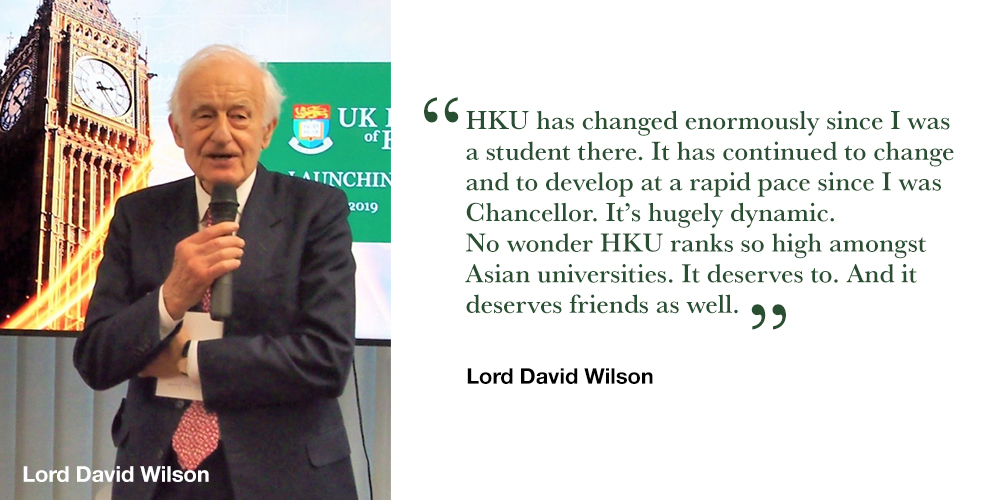
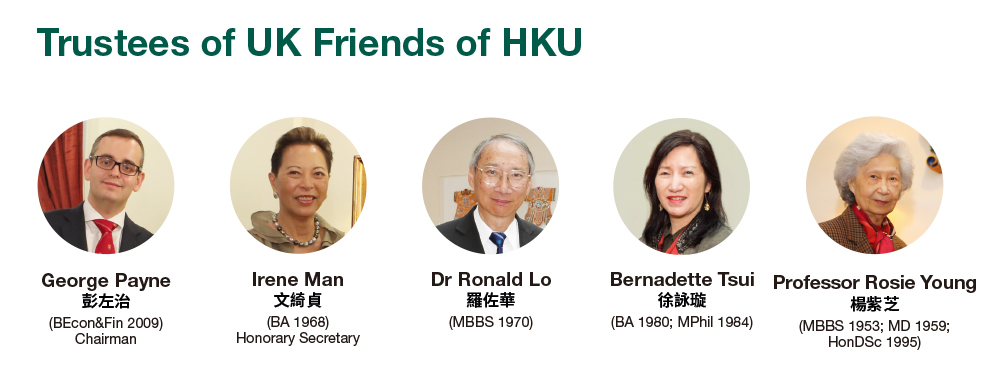

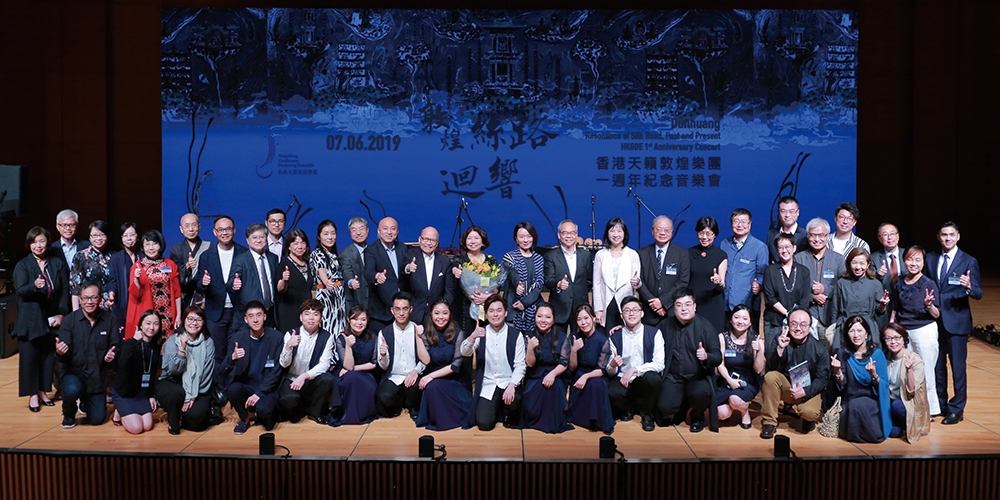

During the Tang Dynasty, Dunhuang was a cosmopolitan city located on the Silk Road. Hundreds of caves were preserved from the Dunhuang Mogao Grottoes, which were carved over a millennium ago and contain invaluable musical relics.
The concert hoped to revisit, reflect and realise the immortal spirits of Mogao and the “never-give-up” spirit of the Lion Rock that creates the miracles of Dunhuang and Hong Kong.
Dr the Hon Li Dak-sum 李達三 (Hon DSocSc 2017), a noted education philanthropist, is the benefactor of the Li Dak Sum Yip Yio Chin Kenneth Li Scholarships, which were established in 2015 to support the university education of selected students from Ning Po College and Ning Po No.2 College. He is also the Founding Chairman of the Ning Po Residents Association (Hong Kong), which established those two secondary schools.
Mr Kenneth Li 李本俊 lauded his grandfather, Dr Li, as his role model, particularly in his generosity in supporting the education sector. Mr Li encouraged the students to take charge to improve their chances of success, and to take advantage of the opportunities given to them.
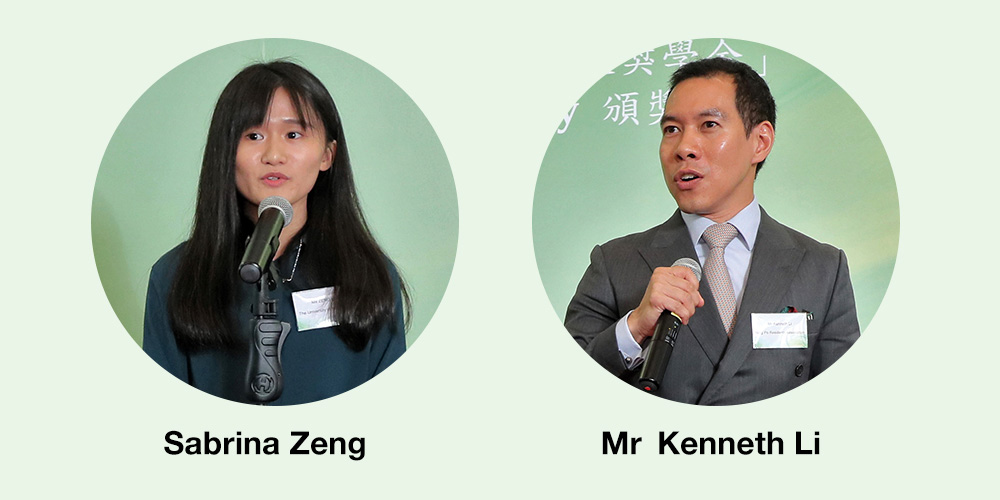
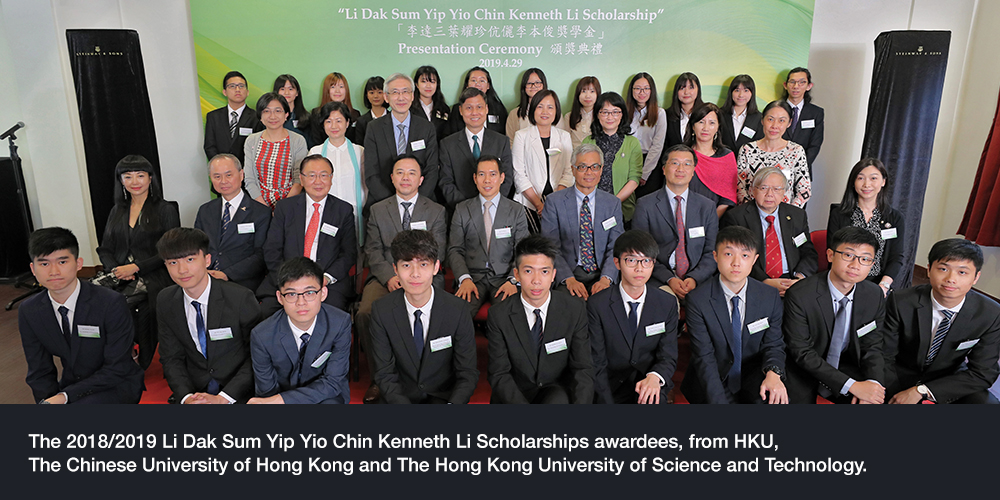
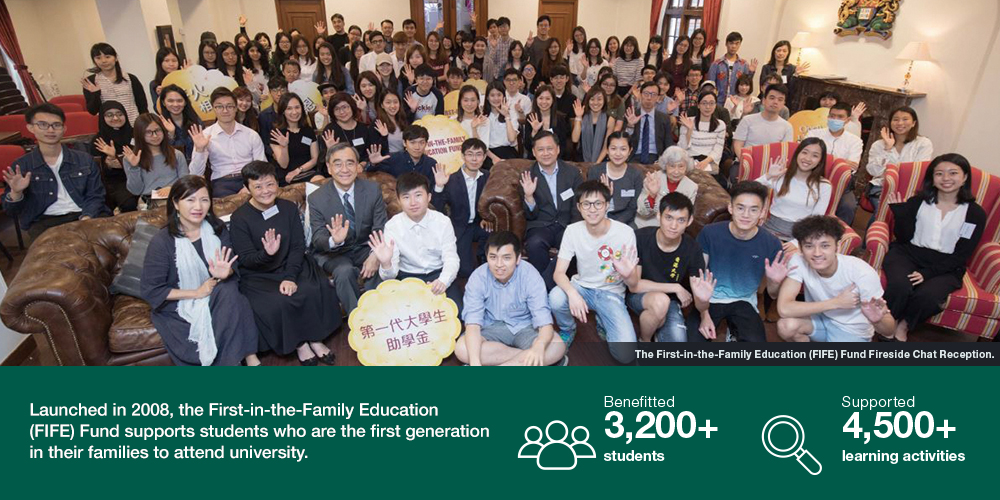
She interned with Kindling Group, a Chicago-based non-fiction media studio, and also had the chance to work with an Oscar-nominated filmmaker on “Finding Yingying”. This feature-length film, which is still in production, is about the real-life story of a Chinese family who travelled to America to search for their daughter, an international student who was kidnapped. “This experience has not just changed me, but it has strengthened my pursuit in creative storytelling,” Fung said.
Dennis Yeung 楊博文 (BEng (ME) Year 4) used the FIFE Fund to participate in the British Model Flying Association competition. “In the early stage of manufacturing, the team was really frustrated; but we finally made it through trial and error. We took fifth place out of 17 teams. Every time I saw our airplane take off and fly into the sky, I felt elated. It symbolised our teamwork and spirit.”
Collective support for new professorship
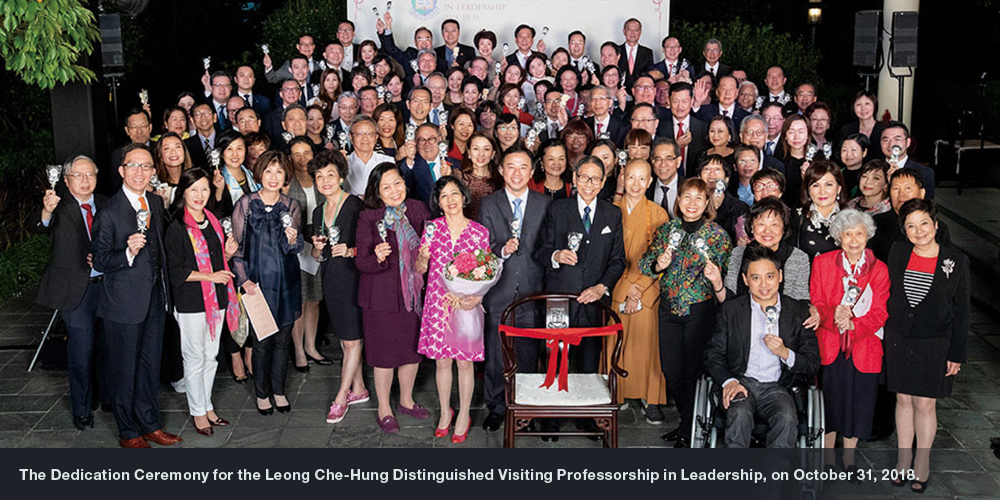
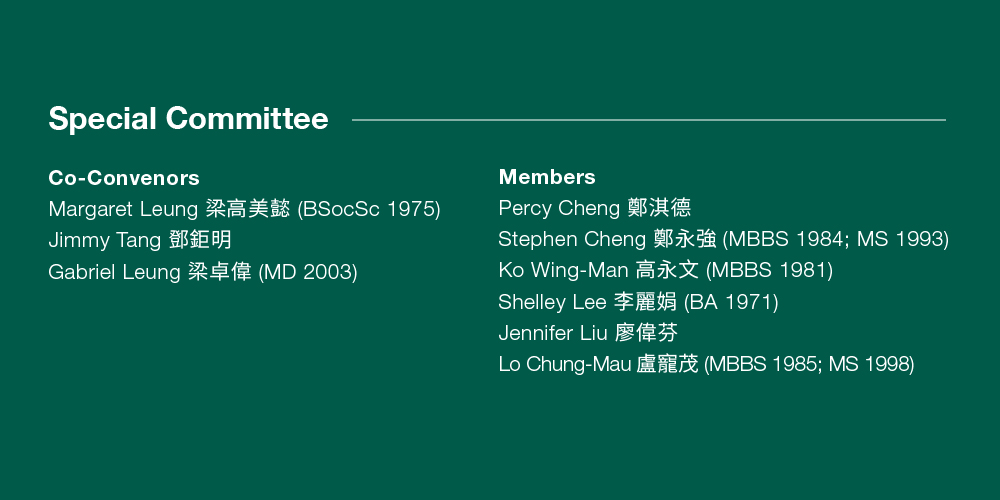
(MBBS 1962; Hon DSc 2006) in perpetuity.
The Professorship will attract world scholars with top distinction in academic and community leadership to the campus. Through this Professorship, the University aspires to provide opportunities for teachers and students to interact with top scholars at the forefront of their respective disciplines, enhance its visibility in the international academic community, and foster invaluable links with leading institutions.
An additional HK$2.6 million raised in donations will go towards the Leong Che-Hung Medical and Research Enrichment Scholarship, which will benefit medical students and research postgraduate students.
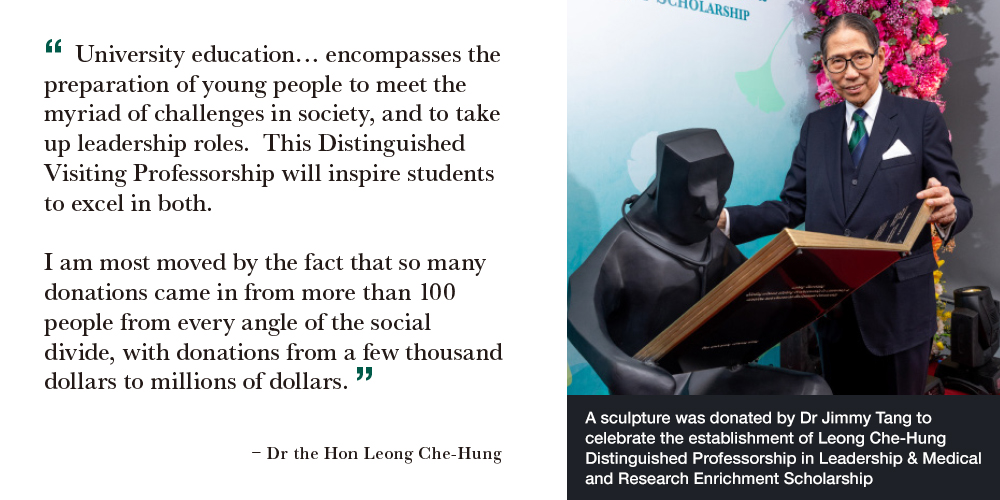
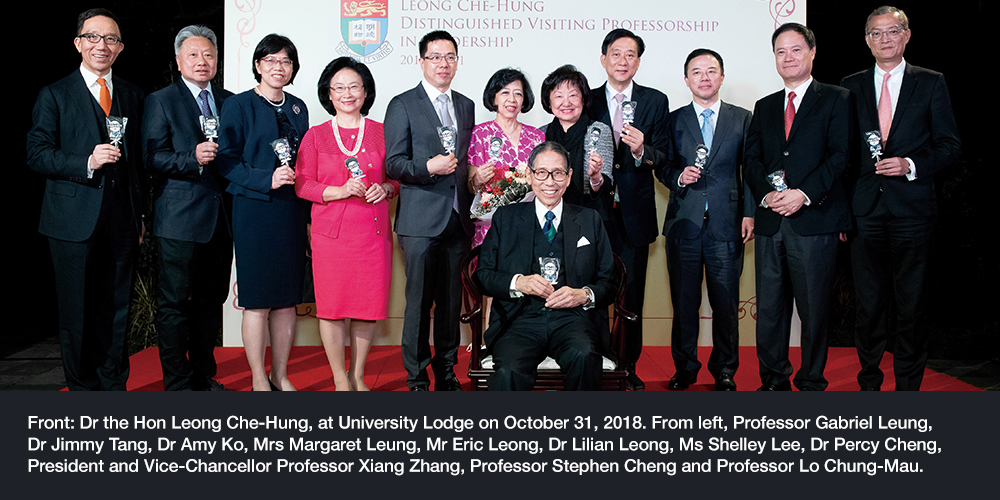
Partnership between Swire and HKU 100 Years of the Taikoo Professorship
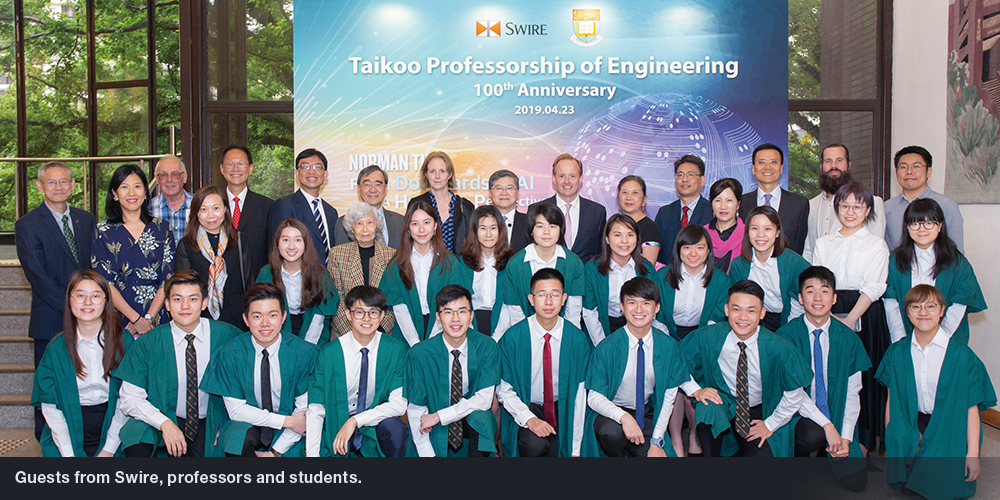
In 1967, to mark the centenary of Swire in the Far East, the Group contributed 10 Swire Scholarships and Studentships to enable graduate students to continue their studies while residing at Robert Black College.
To date, there are 350 Swire Scholars from diverse backgrounds and academic fields, including filmmaker Dr Ann Hui 許鞍華 (BA 1969; MA 1973; Hon DSocSc 2014); Professor Vivian Yam 任詠華 (BSc 1985; PhD 1988), Philip Wong Wilson Wong Professor in Chemistry and Energy; Professor Raees Baig 碧樺依 (BSW 2004; PhD 2010) Chairperson of Amnesty International Hong Kong; Dr Zhang Yi 張一 ( PhD 2013) post-doctoral fellow at the Chinese Academy of Social Sciences; and Dr Erick K’Omolo (PhD 2016), founder of the Maklweta Trust in Kenya.
In 1980, Swire made a contribution towards the building of Swire Hall, a student hostel for 300 undergraduates. There are now over 6,000 Swirians.
Swire’s numerous contributions to the University include the Swire Chair in Japanese; the Swire Marine Laboratory, later re-named the Swire Institute of Marine Science (SWIMS); and Swire Visiting Studentships for senior research officials from the Ministry of Commerce of the PRC Government.
